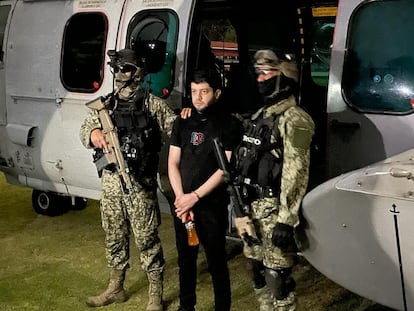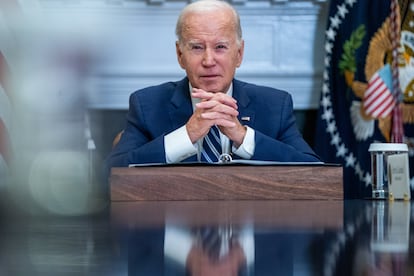Succession struggles and a wave of internal violence: What the arrest of ‘El Nini’ means for Mexico’s Sinaloa Cartel
Néstor Isidro Pérez Salas was the head of security for Los Chapitos, the branch of the organization led by the sons of El Chapo, and suspected of orchestrating the violence unleashed in response to the detention of Ovidio Guzmán

Wednesday’s arrest of Néstor Isidro Pérez Salas, alias “El Nini,” has left question marks in the Mexican city of Culiacán over what comes next. Salas, head of security for Los Chapitos, one of the branches of the Sinaloa Cartel headed by the sons of Joaquin “El Chapo” Guzmán, was one of the highest-profile figures in this criminal organization and a top priority for the United States. However, his arrest opens the door to a rearrangement in the hierarchical structure of the cartel that is expected to result in a fight for succession and a wave of internal violence, as has happened on previous occasions. El Nini gained prominence in 2019 following a bloody confrontation with the leader of Los Rusos, one of the armed factions of the Sinaloa Cartel led by Ismael “El Mayo” Zambada, which operates north of Sinaloa’s capital.
As a sort of calm before the storm, state authorities on Thursday said they had reported no incidents as part of the cartel’s response to the arrest of El Nini, who was at the head of a group operating within the structure of Los Chapitos known as Los Ninis. According to documents leaked by the Mexican army, this was an organization of young hitmen between the ages of 20 and 35 that was mostly dedicated to security tasks. Los Ninis will now have to find a new leader, which has placed Culiacán on high alert; successions within cartels have historically brought extensive bloodshed in Mexico. Sources familiar with the cartel structure, who prefer to remain anonymous for security reasons, expect the arrest of Salas to lead to more violence: not necessarily very visible, but they expect the realignment to result in the settling of scores and deaths.
Los Chapitos appeared on Washington’s radar due to the group’s links to fentanyl production and distribution. Pressure from the United States led to the arrest and extradition last January of El Chapo’s youngest son, Ovidio Guzmán López. The latest blow was dealt this week to the security chief, who is accused of being a hitman operating under the orders of Óscar Noé Medina González, alias “El Panu,” who is also the right-hand man of Iván Archivaldo Guzmán, the current leader of Los Chapitos. The U.S. Justice Department has charged Salas with cocaine and methamphetamine trafficking, possession of firearms and explosive devices, and witness intimidation.

“For nearly three years, El Nini has been one of Mexico’s and the United States’ most wanted criminals, indicted by the United States for his roles in perpetrating violence and illicit fentanyl trafficking into the United States,” U.S. President Joe Biden said in a statement. “I want to thank President López Obrador and the Mexican army and special forces for effectively capturing El Nini.”
Salas gained visibility in 2019 as an internecine war broke out in the Sinaloa Cartel between his faction and Los Rusos, who answer to El Mayo Zambada, El Chapo’s former partner. Versions on how and why the bloody feud broke out differ. Sources familiar with the cartel’s operations say it started when a member of Los Ninis assassinated an in-law of El Ruso, a senior Zambada lieutenant in Agua Caliente, north of Culiacán. El Ruso, who is known as Jesús Alexander Sánchez Félix by some and Miguel Ángel Gaxiola Quintero by others, asked El Nini to hand over the assassin. When Salas refused, he responded by carrying out a revenge killing of one of El Nini’s men. The confrontation lasted for several months and escalated until El Mayo put an end to it by sending El Ruso to another area, according to the same sources. The internal conflict ended there, but Zambada’s faction broke off ties with El Nini.

The Mexican army tells a very different story. The leaked Mexican Defense Ministry (Sedena) documents trace the origin of the feud to November 2019, when Los Rusos attacked a group of municipal police officers working for Los Chapitos. The reasons for the internal war, according to security forces, are linked to a turf battle for dominance in drug production and sales. Sedena describes Gaxiola Quintero as Zambada’s security chief in a document dated March 2020 and interprets the fight between the two groups as a confrontation between different factions of the Sinaloa Cartel.
Authorities also link Salas to two violent episodes known as the Culiacanazos. The first took place in October 2019, when the military detained Ovidio Guzmán and then released him by order of President Andrés Manuel López Obrador after a day of blockades, shootings, and kidnappings in response by the cartel. The authorities credit these attacks to El Nini, who they point to as the main orchestrator. In that first episode, however, all factions of the Sinaloa Cartel united to defend The Mouse, as El Chapo’s youngest son is known. In the second Culiacanazo — the response to the January 2023 arrest of Ovidio Guzmán — Salas is also accused of coordinating the cartel’s hours-long backlash, which included shooting at commercial airliners and laying siege to the city, resulting in the deaths of 29 people.
Sign up for our weekly newsletter to get more English-language news coverage from EL PAÍS USA Edition
Tu suscripción se está usando en otro dispositivo
¿Quieres añadir otro usuario a tu suscripción?
Si continúas leyendo en este dispositivo, no se podrá leer en el otro.
FlechaTu suscripción se está usando en otro dispositivo y solo puedes acceder a EL PAÍS desde un dispositivo a la vez.
Si quieres compartir tu cuenta, cambia tu suscripción a la modalidad Premium, así podrás añadir otro usuario. Cada uno accederá con su propia cuenta de email, lo que os permitirá personalizar vuestra experiencia en EL PAÍS.
¿Tienes una suscripción de empresa? Accede aquí para contratar más cuentas.
En el caso de no saber quién está usando tu cuenta, te recomendamos cambiar tu contraseña aquí.
Si decides continuar compartiendo tu cuenta, este mensaje se mostrará en tu dispositivo y en el de la otra persona que está usando tu cuenta de forma indefinida, afectando a tu experiencia de lectura. Puedes consultar aquí los términos y condiciones de la suscripción digital.









































